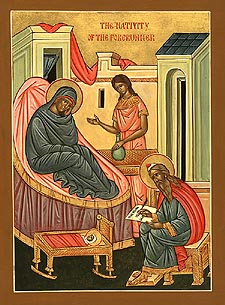|
|||
|---|---|---|---|
| This weekly bulletin insert complements the curriculum published by the Department of Christian Education of the Orthodox Church in America. This and many other Christian Education resources are available at http://dce.oca.org. | |||

An important feast in the life of the Church is the Nativity of John the Baptist. John grew up to be more than an energetic servant of God, preaching and baptizing. He also attracted numerous followers with his strong faith and absolute integrity. He fearlessly challenged people to "bear fruits of repentance" and he had a message for each person. He told tax collectors to take no more than the prescribed amount of revenue. Soldiers were admonished to be satisfied with their pay and never extort money through threats or false accusations. But despite his ability to draw loyal crowds to himself and effectively challenge their behavior, John was a profoundly humble man. When he recognized Jesus Christ as the Savior, he didn't hesitate to withdraw and say, "I am not worthy to untie the thong of his sandal." He was astonished, but obedient, when Jesus requested baptism in the Jordan at his hands. As we celebrate John's birth, we are reminded of Chapter 11 of Matthew's Gospel. It contains Jesus' words about John: "...among those born of woman no one has arisen greater than John the Baptist." The chapter begins with John in prison. He sends word to Jesus to ask, "Are you the One who is to come, or are we to wait for another?" It seems a strange question, coming from John. Having done so much and given up so much to prepare the world for the Messiah, is he still unsure that Jesus is the One? Must he die at Herod's hands without certainty? Jesus' answer at first seems merely a statement of the obvious. He tells the inquirers to share with John what they "hear and see" meaning His healings and the good news He brings to the poor. But there is deep significance in Jesus' response. He describes the things He is doing in words that reflect Isaiah's description of the coming Savior (Isaiah 35:5, 26:19, 29:18 and 42:7). He is assuring John, who is intimately familiar with Isaiah's words, that He is their fulfillment. Then Jesus adds a word of encouragement: "Blessed is anyone who takes no offense at Me." The phrase "take offense" can also be translated as "fall away" or "desert." Jesus is telling John not to lose heart; since he has not fallen away or deserted Jesus, as even the disciples of Jesus will, he is blessed.
In the same chapter, Jesus describes people who have fallen away and deserted. They weren't satisfied with John who "came neither eating nor drinking" or with Jesus who came "eating and drinking" and who could therefore be rejected as "a glutton and a drunkard, a friend of tax collectors and sinners!" People still find fault with Jesus and those who serve Him, and use their fault-finding as an excuse to desert Him. But John the Baptist, despite being required to give his life, didn't fall away or desert the Lord. And despite the firm way Jesus describes fault-finding "deserters" in Matthew 11, the chapter ends with His wonderful invitation: "Come to me, all you that are weary and carrying heavy burdens, and I will give you rest." |
|||
